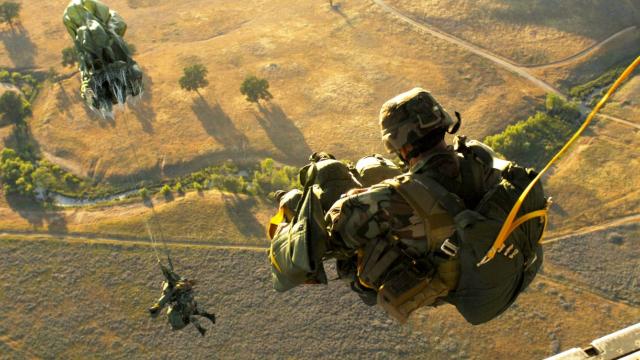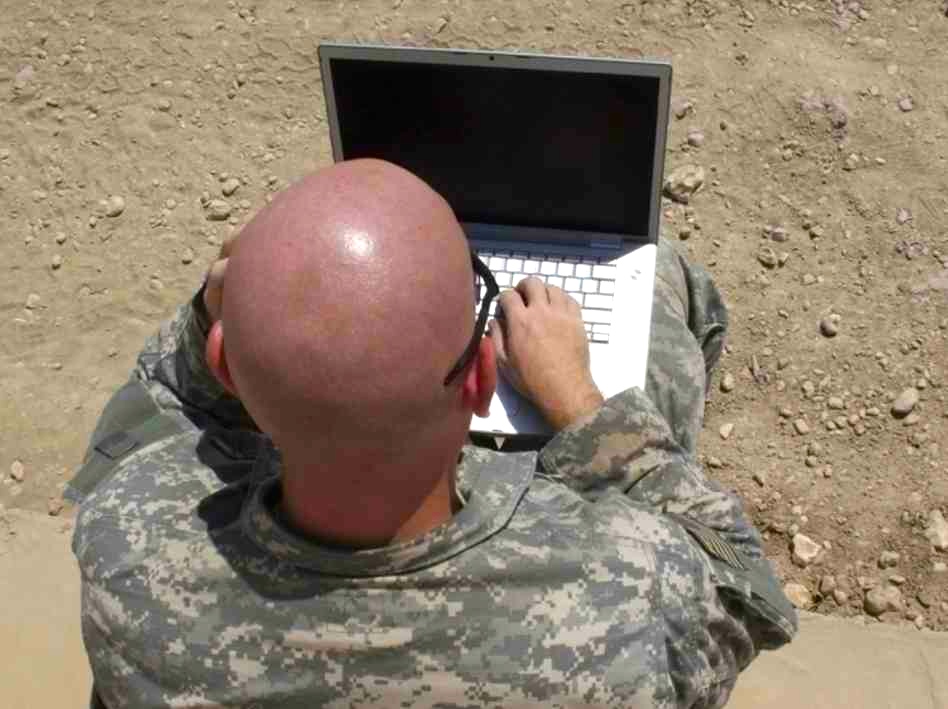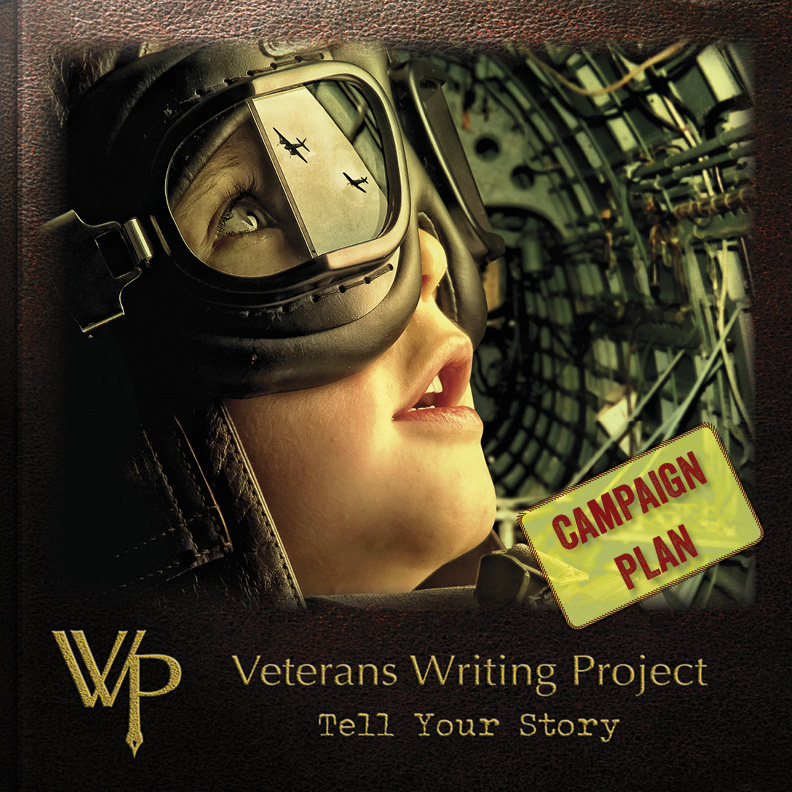
For a large number of U.S. soldiers returning from combat, adequate psychological care is difficult to come by. Many are ushered into crowded Veterans Affairs waiting rooms and given a list of symptoms to check off. Diagnosed and treated impersonally, some are prescribed meds before they even receive any form of therapy – and unsurprisingly, the streamlined process fails to give many veterans the help they need, leading some returning soldiers to seek out alternate methods to heal their anguish.
That was certainly true for Brett Foley, a marine who served two combat tours, one in Iraq and one in Afghanistan. Upon returning home, Foley began working as a security officer in a hospital but had a rough time transitioning from military life.
"I was drinking a lot then, my wife was not really happy with me," he said. "I think I was just making some bad choices. It was a struggle, indefinitely."
Unfortunately, Foley found little comfort when he attempted to use the healthcare system put in place for veterans.
"I wasn't really happy with them, and was pretty frustrated," Foley said of the Veterans Administration health center he visited in Wisconsin. "It was packed wall to wall with people, whether they were World War II, Korea, Afghanistan, or Iraq veterans. When I finally got in for my appointment, I saw a doctor for maybe five or ten minutes and they made an initial diagnosis after I finished a 20 questionnaire pamphlet about my moods and nightmares.
"They diagnosed me and prescribed medication right away," he continued, and "that blew my mind because I couldn't understand how they could prescribe me mind altering medications after speaking to me for 15 to 20 minutes at most. I thought, 'If this is how they're treating me, they must be treating everyone like this.'"
This all changed when Foley began speaking with David Chrisinger, a friend who eventually helped him start the website Running 50, which works to help veterans find renewed purpose in their lives after combat. Chrisinger encouraged Foley to write about his harrowing experiences, which ended up kick-starting the healing process for him.
"I started to feel better," Foley said. "When I was writing stuff down, it made me think of the situation in its totality. I had to go through every word and put it all onto paper and then I could read through it and I could process everything.
"For some reason when I wrote it all down on paper, it felt like this big release – especially when I could give it to someone else to read and understand."
Zach Ruesch, who served in Afghanistan, had a similar experience when he returned home and found out that adjusting to civilian life was harder to face than deployment.
"I didn't like being alone," recalled Ruesch. "I needed to know that there was a human presence nearby that I could trust."
Ruesch battled what he described as "intense feelings of anger and aggression" that would emerge unexpectedly, making it difficult for him to ease back into academic life, and which began to hinder his goal of becoming a teacher. A straight-A college student before deployment, Ruesch found his coursework after war to be a "huge frustration."
And the same could be said of his experience with the U.S. Department of Veterans Affairs.
"You first go into the VA and they say, 'Just the boxes on this form,' and determine that you have this or that and say, 'Here's some pills.' They wash their hands of you almost," he said.
But for Ruesch, there was a different outlet. He began keeping a journal to chronicle his experiences from the war. Eventually, he was encouraged to publish his story on Running 50.
"It was the first time that I had written anything with some cohesive bigger point and putting it out there on the Internet was a big deal," Ruesch said.
"The experience of thinking about it and writing it was a culmination for me. Writing it was a way of looking back on deployment and transitioning and getting myself to a point where I felt really good."
The support he got from other veterans who read his work reassured Ruesch that he was doing the right thing. "The response that I received from it, the comments other veterans and civilians made, really helped me."
And Ruesch is only one of many soldiers for whom writing has helped turn the page. In the last 10 years, putting the experience of war into written language has emerged as a popular form of therapy for growing numbers of veterans. This is largely due to the upswing in organizations and volunteers devoted to helping veterans make sense of post-combat life through prose, including the Veterans Writing Project and the literary journal O-Dark-Thirty.
There's also Veterans’ Voices of the Hospitalized Veterans’ Writing Project (HVWP), which assists veterans with rehabilitation through therapeutic writing.
"Many veterans tend to shy away from traditional forms of therapy for a variety of reasons," David Surface, director of the Veterans Writing Workshop, told Occupy.com.
"A writing workshop allows some veterans to deal with difficult experiences and emotions without feeling like they're being psychoanalyzed or stigmatized. Many veterans also suffer from social isolation, sometimes from other people in general, sometimes from other veterans. Being part of a writing workshop gives those veterans the opportunity to meet and bond with others in a non-stigmatizing setting where 'meeting and bonding' is not the express agenda.
"The therapeutic value of writing goes a lot farther and deeper than simply 'unloading' difficult emotions," Surface added. "A serious, concentrated focus on the writing process helps strengthen all kinds of cognitive skills (planning, evaluating, decision-making) that can help veterans in all areas of their lives."
Pete McShane, a Vietnam Veteran who has benefited from the Syracuse Veterans' Writing Group, said writing is "a way for a veteran to articulate memories that are often fragmented or blurred either because of the passage of time, or the effects of our subconscious to protect us from painful memories."
And, "secondly, it is a way to connect with other veterans, regardless of age or military experience," he said. "There is a commonality of purpose and experience because the military turns individuals into teams. There’s a synergy associated with teambuilding, where the effectiveness of the group is more than the sum total of the individuals. It’s all about the team’s mission and relying on your teammates is a critical part of that philosophy.
"[Furthermore] once a veteran writes about his or her memories, family and friends can come to understand their individual experiences," McShane added.
But writing is not for everyone, and large numbers of veterans remain unable to grapple with what is going on inside them. In 2009, a Rand Institute study revealed that 300,000 veterans suffer from some form of psychological disorder. The study also concluded that only four U.S. states have a suicide rate among vets that is at or below 20 per 100,000 people.
Veterans are twice as likely to commit suicide as civilians. And the enduring mental health crisis means they face mounting difficulties when it comes to finding employment.
"An estimated 20% of Afghanistan and Iraq veterans screen positive for PTSD or depression, and the mental health community is, at best, disjointed in dealing with this," retired Lt. Col. Steve Brozak wrote in a CNN piece last year.
"Veteran's Affairs spent $6.2 billion – up slightly from last year – on inpatient, residential, and outpatient mental health programs, but veterans are still having difficulties being treated. "In fact," he added. "the VA recently released data showing that a third of veterans seeking mental health appointments wait longer than 14 days.
"In cities like Orlando, Houston and Los Angeles' VA hospitals, the wait times are even higher. In Houston, for instance, veterans waited an average of 28 days for an appointment. The initial step to seek treatment can be a hurdle in and of itself, and half of those with PTSD go untreated."
For many, accessing non-traditional forms of mental health treatment is an arduous process. As Surface noted, the number of organizations that aim to help veterans through writing remain scarce.
"In New York City, for instance, there are many good, solid writing programs for veterans; in fact, it almost seems like there's a new one every day," Surface said.
But, "obviously, that's not the case for veterans in many other parts of the country. We [at the Veterans Writing Workshop] get a lot of inquiries from veterans and organizations all over the U.S. who are either looking for a veterans writing workshop in their area, or wanting advice on how to start one. So the need and the demand is great."
Ruesch said he believes that as more troops return home, the VA will have to find better treatment methods.
"It is going in the right direction," Ruesch said. "Now that the wars are winding down, they hopefully can get their shit together and not just make the care streamlined, but make it effective: offer them all of these services and have them select the best one for them.
"It can't be, 'Just give me a pill and send me to a counselor.' It may be, 'Give me counseling and support on a personal level as well as other options," he added, "like music, physical activity – or writing."
3 WAYS TO SHOW YOUR SUPPORT
- Log in to post comments













